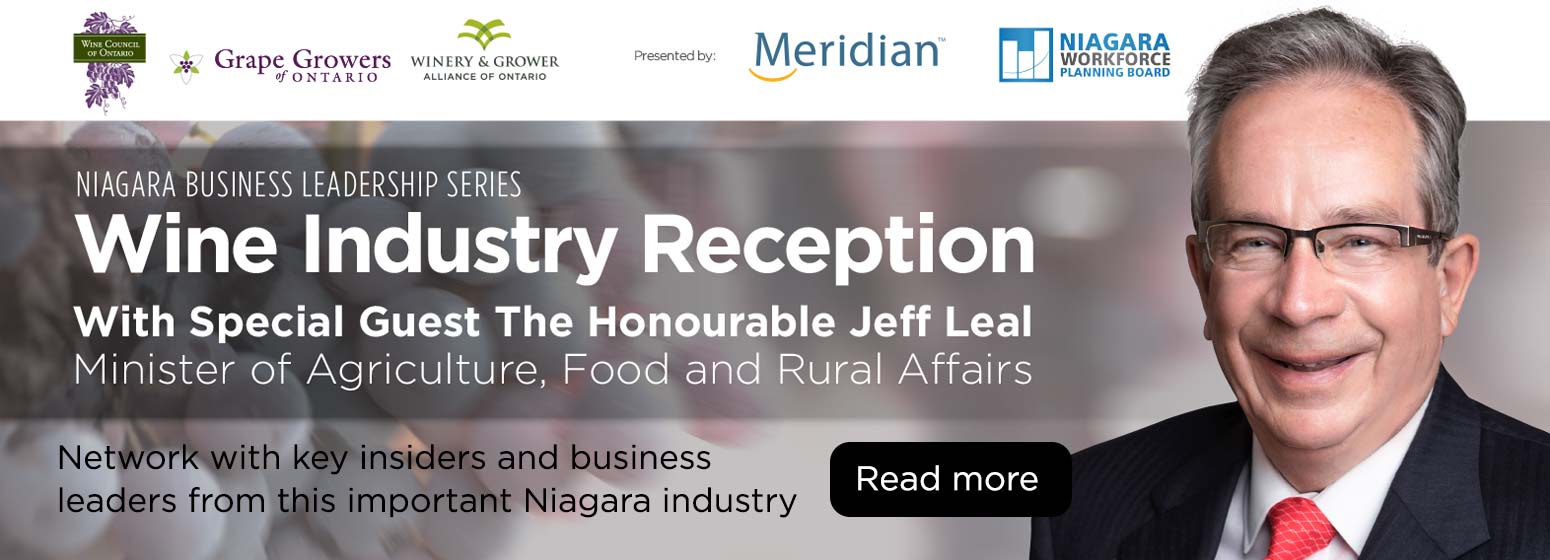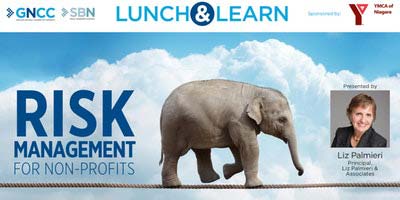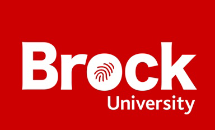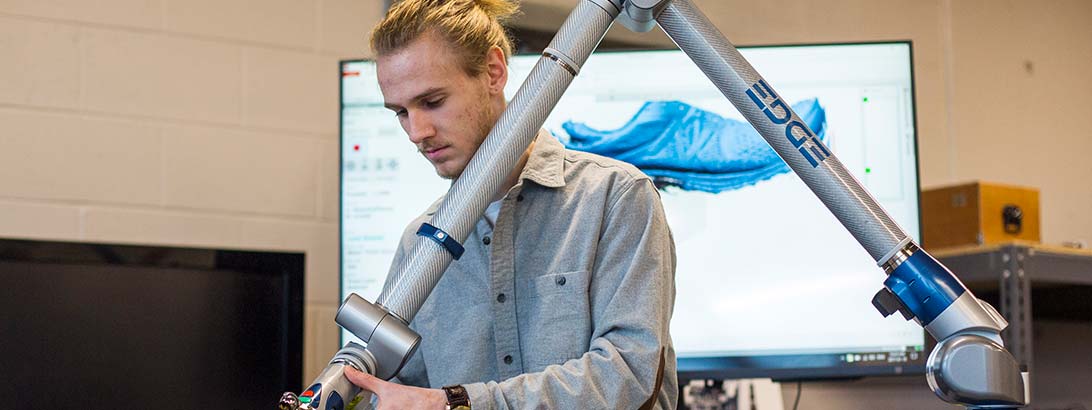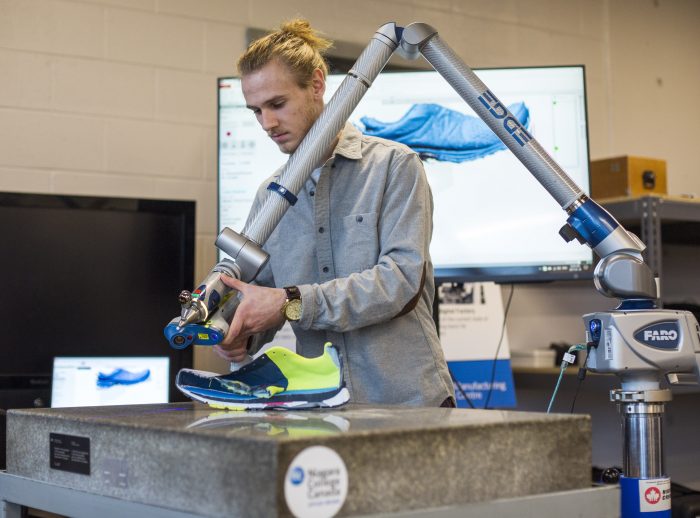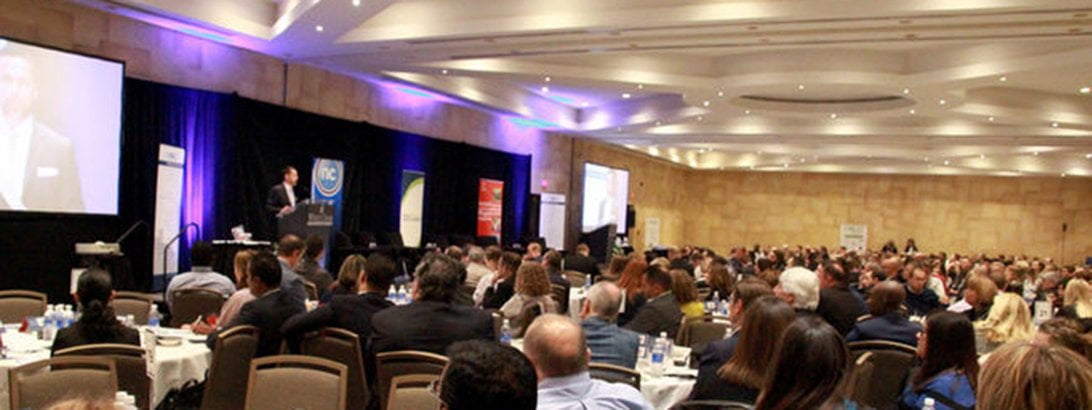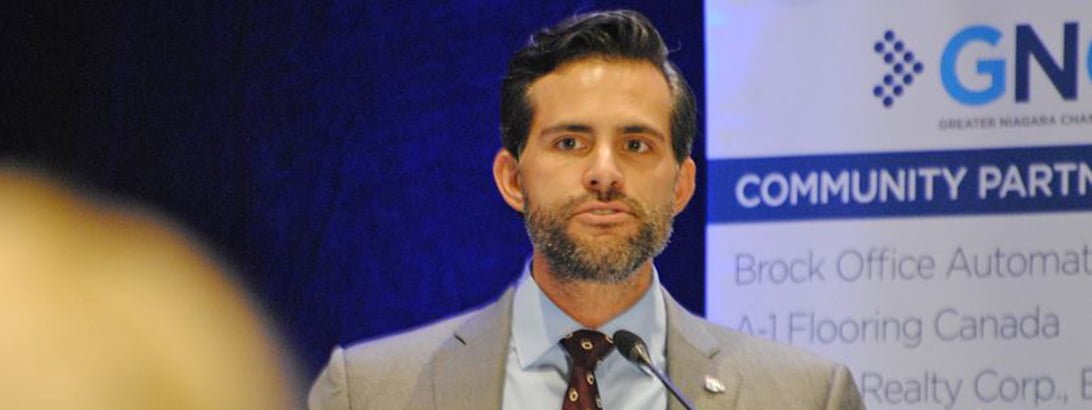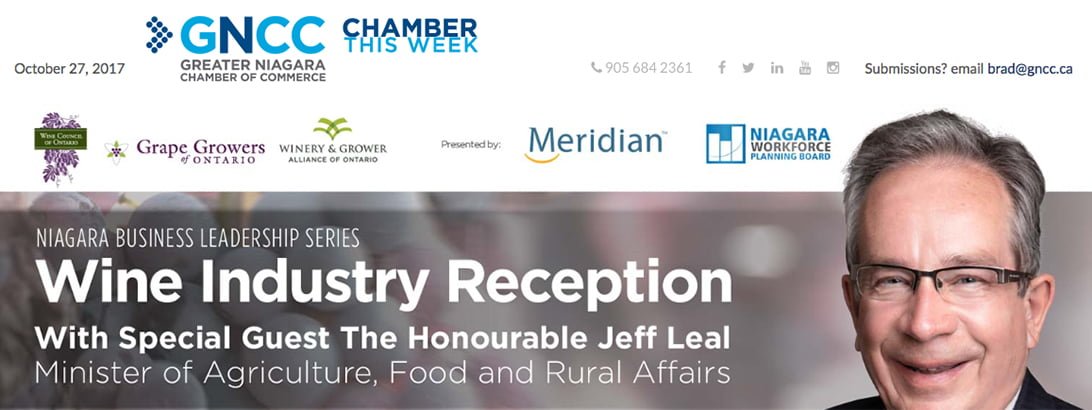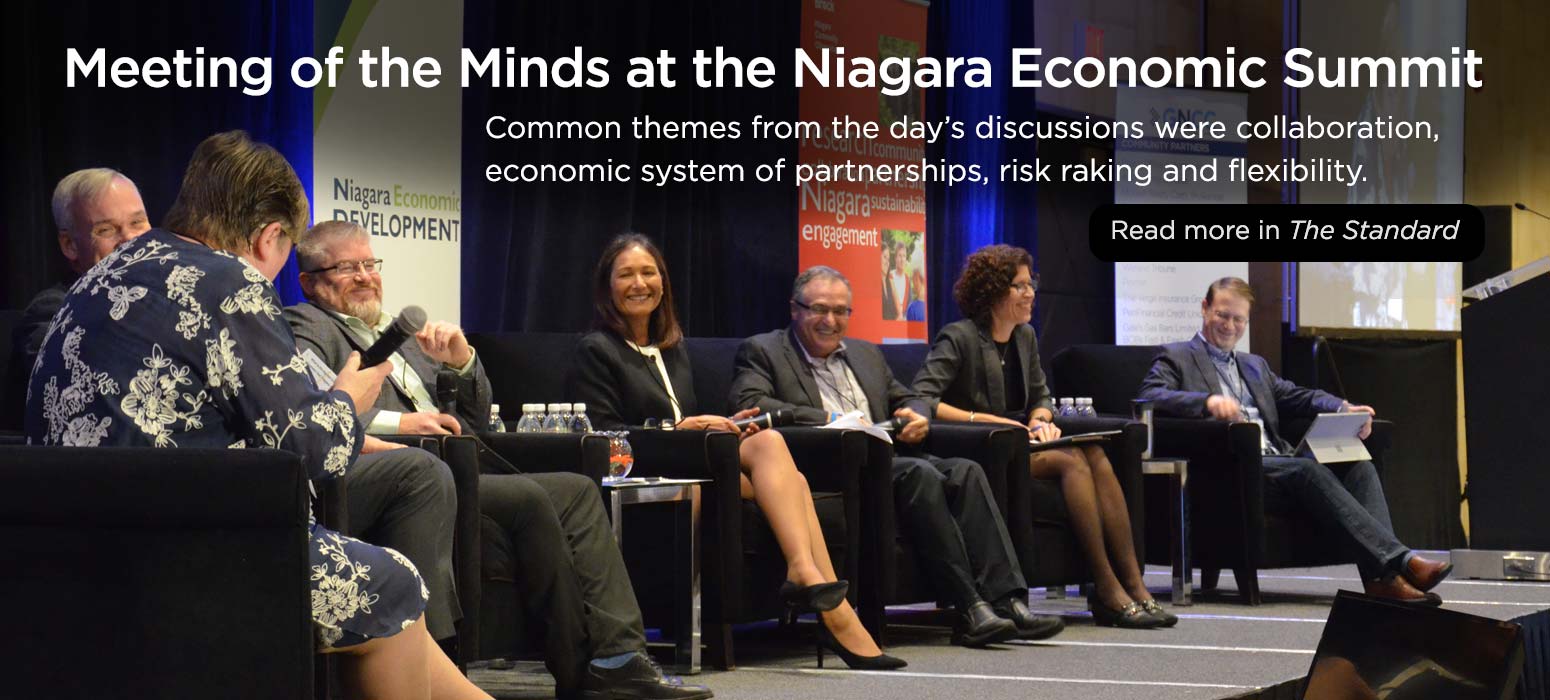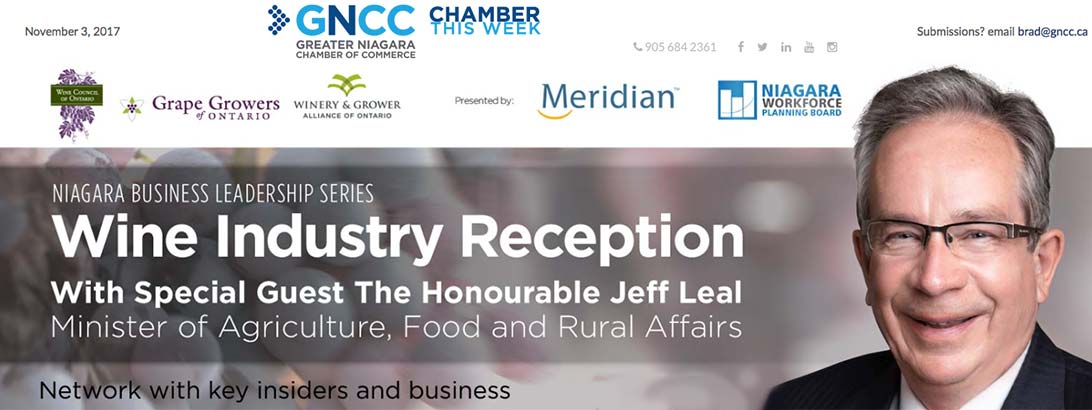
| November 3, 2017 | Submissions? email brad@gncc.ca |
UPCOMING
EVENTS

Business After 5
Hosted in November by Stevensville Garden Gallery
November 7, 2017 • 5:00pm—7:00pm
2821 Stevensville Road
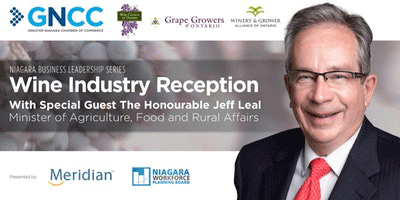
Wine Industry Reception
With Special Guest The Honourable Jeff Leal, Minister of Agriculture, Food and Rural Affairs
November 9, 2017 • 5:00—7:00pm
Niagara College Wine Visitor & Education Centre
135 Taylor Road
Niagara-on-the-Lake

Business Breakfast Before 9
November 15, 2017 • 7:15am—9:00am
Hilton Garden Inn
500 York Road
Niagara-on-the-Lake

Women in Business Awards
November 17, 2017 • 11:00am—2:00pm
Crowne Plaza Niagara Falls – Fallsview
5685 Falls Avenue
Niagara Falls
NEW MEMBERS:
OCTOBER 2017
Please join us in welcoming the new members who joined in October 2017.
MEMBERS
IN THE NEWS
Earning Real World Experience
Seventy-two Grade 9 students from Port Colborne High School spent Tuesday at pharmacies, restaurants, daycares, nursing homes, and auto and manufacturing shops, gaining exposure into the work world of their parents and relatives during the annual Take Your Kids to Work day.
Hannah Walker spent the day with her mother, Dr. Amanda Bell, learning about medical education and how students are trained to become doctors at the Michael DeGroote School of Medicine, Niagara Regional Campus.
Momentum Choir and The Caverners to Perform at Bethany Community Church
On November 19, Momentum Choir and The Caverners will present a special concert, and early bird tickets are on sale now through November 12. Special rates are available for students, support individuals and families.
Momentum Choir is comprised entirely of adult musicians with disabilities from Niagara; they have been performing to audiences across Niagara for over 10 years. The Caverners are Canada’s premier Beatles tribute band.
Spread Holiday Cheer with Gillian’s Place
Gillian’s Place needs your support this holiday season to help the abused women and children they serve, so that they are able to celebrate the joy of the season in a safe environment.
To make the holiday season a little easier for their clients, Gillian’s Place offers many ways you can help to spread the joy of the holiday season in a meaningful way, including Adopt-A-Family programs, Tree Tags, and Holiday Drives.
Holiday HandMade Market this Weekend
Residents can sip, shop and savour this weekend at Niagara’s largest indoor holiday craft market. The Holiday HandMade Market continues on Saturday and Sunday at the Scotiabank Convention Centre. It features 180 artisans from Ontario and Quebec as well as a cafe and wine bar and live entertainment.
“Whether you’re looking for a unique gift or something for yourself, the HandMade Market is the place to find goods that cannot be found at the mall,” said Mark Elliotson, a website/graphic designer who organizes the event with his wife Jennifer, an artist.
Why Liquor and Weed Are a Perfect (Financial) Mix
With recreational marijuana slated to become legal next year, provincial governments are determined to keep the sale of weed completely separate from the sale of alcohol, establishing dedicated cannabis retail outlets. But alcohol and marijuana companies have fewer reservations about joining forces.
Constellation Brands, the owner of Corona and a large number of wine and spirits labels, purchased a 9.9 per cent stake in Canopy Growth Corp. for $245 million this week.
Border Improvements Briefing, Workshops & Networking on International Trade Day
The Government of Canada and U.S. Customs and Border Protection are partnering for a day of workshops and networking on International Trade Day. The event takes place at the Harbor Centre Ice Rinks and Marriott Hotel in Buffalo.
The event includes a Can-Am Border Improvements Briefing Panel, as well as workshops including Border Crossing 101, Moving Goods Via ACE/Single Window Initiative, Can-Am Business Immigration/Mobility, and Positioned for the Future: USCBP 10 Centers of Excellence & Expertise.
Niagara College Earns Top 10 Place for Third Year in a Row Among Research Colleges in Canada
For the third year in a row, Niagara College has earned the honour of being in the top 10 colleges in the country for research funding, according to a new national study released today. And for the second year in a row, that placement is No. 7.
In its report “Canada’s Top 50 Research Colleges,” Re$earch Infosource Inc. has announced the rank of seven for Niagara College, based on total research funding numbers for 2016. This represents a steady placement of three years in a row in the top 10, since Niagara College earned spot No. 10 in the 2014 research funding year.
Mum’s the Word at Floral Showhouse
A new chrysanthemum display debuted at the Niagara Parks Floral Showhouse in Niagara Falls on Monday, October 28. until Nov. 19. Pinks, Greens, Yellows and bronzes are on display including brush varieties, cascading collections in baskets, pillars and pyramids as well as large single-stem exhibitions.
Visitors can continue outside to see the Niagara Parks Life on Display exhibit which includes repurposed vintage pieces from the Durham Region’s former Cullen Miniature Village collection, including a series of Muskoka cottages.
Niagara Public Construction Procurement Summit
The first-ever Niagara Public Construction Procurement Summit takes place on November 22. The event is presented by Public Procurement for Local Prosperity (PPLP).
The symmit brings together procurers, general contractors, trade contractors, heavy construction companies and consultants to the industry such as architects and designers to discuss issues such as harmonization and how to improve the prequalification process to benefit everyone.
Please visit gncc.ca for more stories. Have a submission? Send it to brad@gncc.ca
NETWORK
NEWS
Send a Message to Queen’s Park with the OCC Fall Member Survey
The GNCC and Ontario Chamber Network are looking for members to help shape our advocacy by completing the Business Confidence Survey. Members can share their insights on the state of the Ontario economy, recent government policy, and the impact on business by taking the five-minute survey.
The Ontario Chamber Network is committed to ensuring government understands the issues impacting Ontario business in this province. That’s why we need your help in ensuring the voice of business is heard loud and clear at Queen’s Park.
Google Parent Chair Says Company Owes Canada, Worried About U.S.-Canada Relations
The head of Google’s parent company contrasted divisive U.S. politics against Canada’s innovation and immigration-friendly policies Thursday, adding his company owes this country a favour — one the Prime Minister said he’d be sure to call in.
Alphabet Inc. chairman Eric Schmidt said during an onstage chat with Justin Trudeau in Toronto that his company is “enormously thankful to Canadians” for the country’s artificial intelligence innovations.
How Canada Can Lead a Bold New Trade Agenda
Say what you will, U.S. President Donald Trump is clearly committed to keeping his campaign promises. His quick re-opening of NAFTA and withdrawal from the Trans-Pacific Partnership leave Canada with an uncertain and mostly defensive trade policy agenda.
To offset this, we should take the second step of proposing new trilateral trans-Atlantic trade talks. During her recent visit to Washington, British Prime Minister Theresa May obtained agreement to pursue a bilateral trade deal. Ms. May needs to fill the gap left by Brexit; Mr. Trump is amenable
![]()
RENEWING MEMBERS:
OCTOBER 2017
The following members renewed their membership in October for another year. Thank you for supporting the Chamber — and supporting business in Niagara.
![]()
MEMBER
PROGRAMS
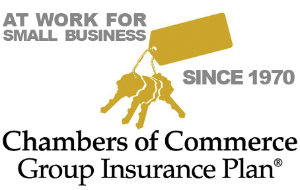
If you’re thinking of adding group benefits to your company, there are a lot of good reasons to put your Chamber membership to work for you. Not the least is exclusivity: only members have access to the Chambers of Commerce Group Insurance Plan®.
To contact your local insurance rep, call Jim Garrett or Cindy Haines at 905-468-8575

Try the purest, freshest water available — one month absolutely FREE. Experience the taste of clean water AND discover why so many homes, schools, and businesses love H2Only… it’s the service. No contracts, no set schedules. You call, we deliver the following business day. That simple since 1995.
Contact: 905-934-0966
sales@h2only.ca www.h2only.ca

MEMBER 2 MEMBER SAVINGS PROGRAM
Many other Chamber of Commerce members feature discounts and special offers — tailored specifically for other GNCC members. Check out the full Member 2 Member database. If you’d like to add an offer for your company, sign in to your account. You can add and update your offer any time you wish.
|
CHAMBER THIS WEEK © 2017 www.gncc.ca. All rights reserved. If you believe you have received this message in error, click here to unsubscribe. Greater Niagara Chamber of Commerce |
|









